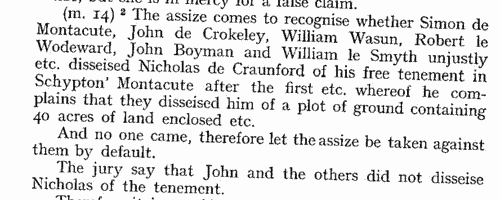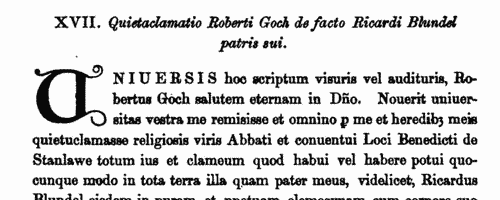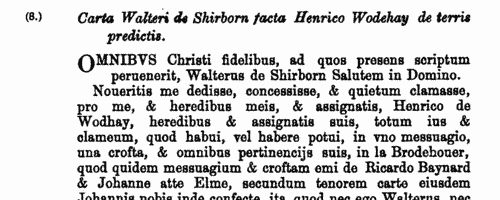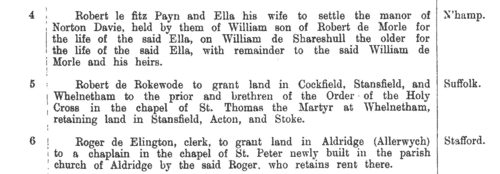Fouk Surname Ancestry ResultsOur indexes 1000-1999 include entries for the spelling 'fouk'. In the period you have requested, we have the following 11 records (displaying 1 to 10): Buy all | | | Get all 11 records to view, to save and print for £38.00 |
These sample scans are from the original record. You will get scans of the full pages or articles where the surname you searched for has been found. Your web browser may prevent the sample windows from opening; in this case please change your browser settings to allow pop-up windows from this site. Somerset Assizes
(1272-1279)
The records of the assizes held by the royal justices in eyre (itinerant) in Somerset during this period were edited by Lionel Landon and published by the Somerset Record Society in 1926. The justices not only tried all civil actions outstanding on their advent, pleas of the crown and common pleas, but also interrogated the juries of each hundred and borough as to the Articles of the Eyre, inquiring into the king's proprietary rights, escheats, wardships, and questions of maladministration. Appendix I adds some scattered Somerset items from rolls for 1204, 1218 and 1240.FOUK. Cost: £4.00.  | Sample scan, click to enlarge

| Grantees of offices, commissions and pardons
(1272-1281)
The Patent Rolls are the Chancery enrolments of royal letters patent. Those for the 1st to the 9th years of the reign of king Edward I (29 November 1272 to 17 November 1281) were edited for the Public Record Office by J. G. Black, and published in 1901. The main contents are royal commissions and grants; ratifications of ecclesiastical estates; writs of aid to royal servants and purveyors; and pardons. FOUK. Cost: £2.00.  | Sample scan, click to enlarge

| Grantees of offices, commissions and pardons
(1317-1321)
The Patent Rolls are the Chancery enrolments of royal letters patent. Those for the 11th to the 14th years of the reign of king Edward II (8 July 1317 to 7 July 1321) were edited for the Public Record Office by G. F. Handcock, and published in 1903. The main contents are royal commissions and grants; ratifications of ecclesiastical estates; writs of aid to royal servants and purveyors; and pardons. Most extensive are the commissions of oyer and terminer to justices to investigate complaints about specific crimes and wrongs in particular counties.FOUK. Cost: £2.00.  | Sample scan, click to enlarge

| Close Rolls
(1333-1337)
The close rolls of the 7th to 10th years of the reign of king Edward III, that is from 25 January 1333 to 24 January 1337, record the main artery of government administration in England, the orders sent out day by day to individual officers, especially sheriffs of shires: they are an exceptionally rich source for so early a period. In amongst this official material, the rolls were also used as a way of recording many acknowledgments of private debts and contracts between individuals. Most of the contents relate to England, but there are also entries concerning Wales, Scotland, Ireland and the English possessions in France: particularly Scotland, where the king was campaigning during this period. This calendar was prepared by A. B. Hinds of the Public Record Office and published in 1898.FOUK. Cost: £4.00.  | Sample scan, click to enlarge

| Lancashire and Cheshire tenants, patrons and friends of Whalley abbey
(1178-1350)
About to leave for the Holy Land in 1178, John, constable of Chester, founded an abbey at Stanlawe (Stanlow) in Cheshire, endowing it with the townships of Staneye (Stanney) and Aston. Inundated by the sea at Stanlow, the monastery was removed to Whalley in Lancashire in 1294, and this foundation of Cistercians (grey monks) became one of the wealthiest in northern England. It received grants of lands in Ince, Garston, Childewall, Aykebergh, Little Woolton and Warrington in southwest Lancashire; Eccles, Barton, Maunton, Swynton, Pendleton, Worsley, Hulton, Westhalghton, Rumworth, Pendlebury, Cadishead and Denton in the south; Spotland, Chadwick, Castleton, Marland, Todmorden, Rochdale, Whitworth, Heley, Falenge, Chaderton, Wardle, Howarth and Saddleworth in the east; Wytton, Derwent, Plesyngton, Balderston, Salebury, Read, Downham, Clithero, Ribchester, Withnall, Wheelton and Stanworth in Blackburn hundred; and Warton, Carleton, Steyninges, Elswick and Preston in Amounderness hundred; as well as further property in Cheshire, in Chester, Nantwich, Northwich, Aston, Backford, Walton and Wynlaton. A careful copy of all these grants was compiled in the 14th century in what is called the Coucher Book or C(h)artulary of Whalley Abbey. The evidence had been carefully sorted and collated in twenty chapters or titles, each containing a transcript of the grants and evidences relating to a separate parish or township. The people that appear in these deeds are the donors, the witnesses, and occasionally tenants or occupiers of adjoining plots of land. The Coucher Book was edited for the Chetham Society by W. A. Hulton, and published in four volumes, starting in 1847. FOUK. Cost: £4.00.  | Sample scan, click to enlarge

| Grantees of offices, commissions and pardons
(1350-1354)
The Patent Rolls are the Chancery enrolments of royal letters patent. Those for the 24th to the 27th years of the reign of king Edward III (25 January 1350 to 24 January 1354) were edited for the Public Record Office by R. F. Isaacson, and published in 1907. The main contents are royal commissions and grants; ratifications of ecclesiastical estates; writs of aid to royal servants and purveyors; and pardons. FOUK. Cost: £2.00.  | Sample scan, click to enlarge

| Fine Rolls
(1369-1377)
The fine rolls of the 43rd to 51st years of the reign of king Edward III record part of the government administration in England, with orders sent out day by day to individual officers, and commitment of particular responsibilities and duties. There is also some material relating to Wales, Scotland, Ireland and the English possessions in France. FOUK. Cost: £4.00.  | Sample scan, click to enlarge

| Fine Rolls
(1377-1383)
The fine rolls of the 1st to 6th years of the reign of king Richard II record part of the government administration in England, with orders sent out day by day to individual officers, and commitment of particular responsibilities and duties. There is also some material relating to Wales, Scotland, Ireland and the English possessions in France. FOUK. Cost: £4.00.  | Sample scan, click to enlarge

| Clerks, clergy, benefactors and tenants of the Hospital of St Nicholas, Salisbury
(1214-1439)
Christopher Wordsworth, Master of the Hospital of St Nicholas in Salisbury, Wiltshire, published an edition of the 15th-century cartulary of that foundation in 1902. While transcribing the text, he interspersed it with notes and lists from his own researches so as to provide a general history of the hospital, and some of the material dates from much later than 1500, and relates to those institutions which he regarded as daughter institutions or offshoots of the hospital. There are later additions to the cartulary through to 1639, and records of the Chapel of St John Baptist on the Isle, the Scotist College of St Nicholas de Vaux (Valle Scholarium), and the collegiate church of St Edmund, Salisbury. There is also a calendar of records belonging to the hospital. The cartulary itself is a quarto codex of 80 leaves, copying charters of bequests to the hospital, and in these the main persons to appear are the benefactors, the witnesses, and occasionally the names of tenants, occupiers of adjoining tenements, and members of the hospital clergy. The cartulary is in six geographical sections: I, Box, Wyvelesford and Manningford Bohun; II, Broad Hinton; III, Fyssherton (Fisherton Aucher or Anger); IV, East and West Harnham; V, Salisbury; and VI, Gerardeston (Gurston in Broadchalke).FOUK. Cost: £4.00.  | Sample scan, click to enlarge

| Landowners and tenants in Middlesex
(1345-1485)
Inquisitions ad quod damnum were held by the appropriate sheriff or escheator (or other officer in whose bailiwick the matter in question might lie) to investigate cases in which the royal or public interest might be damaged by proposed alienation or settlement of land (especially alienation to religious uses, into mortmain). The key findings from these inquisitions were as to the tenure of the land and the service due from it; its yearly value; the lands remaining to the grantor, and whether they sufficed to discharge all duties and customs due from him; and whether he can still be put upon juries, assizes and recognitions, so that the country be not burdened by his withdrawal from them. Generally speaking, this process had the makings of a system of licensing such alienations, and raising money in proportion to the valuations. Equally, there are many items that deal with subjects such as the closing of public roads, the felling or inclosing of woods, or the proposed grant of liberties or immunities. A calendar of these inquisitions from the 19th year of the reign of king Edward III to the 2nd year of Richard III was prepared by the Public Record Office and published in 1906. We have now indexed this calendar by surname and county. Most of the individuals appearing in the calendar are either pious individuals seeking to make grants to religious bodies for the sake of their souls; or landowners securing the disposition and settling of their real estate. But some other names do appear - tenants, trustees, chaplains and clerks.FOUK. Cost: £6.00.  | Sample scan, click to enlarge

|
| 1 | 2 |  |
Research your ancestry, family history, genealogy and one-name study by direct access to original records and archives indexed by surname.
|












